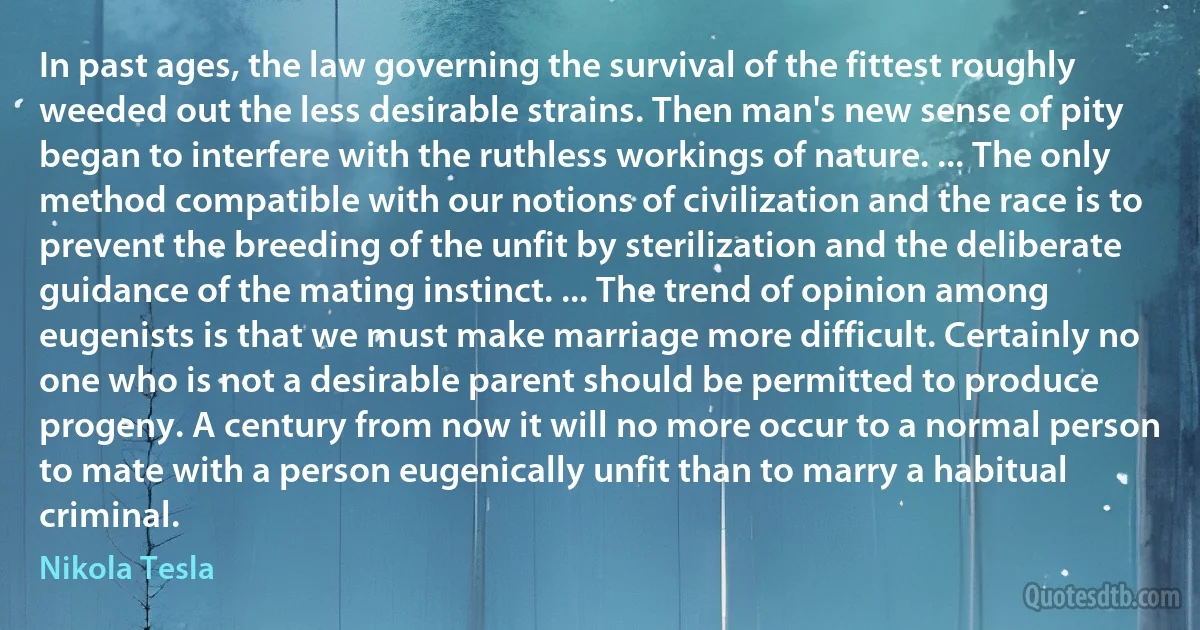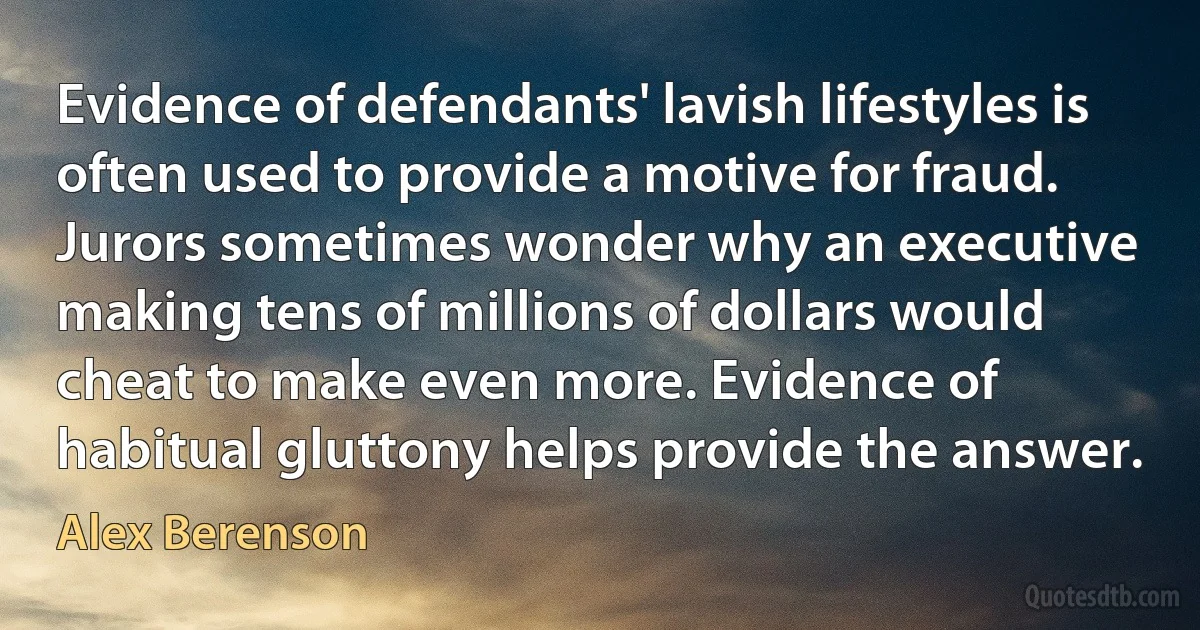Habitual Quotes - page 3
Being law-abiding means filing a paper on time, not parking near a hydrant, and getting a zoning variance before moving a fence on one's own property. A world continually tighter in these ways intensifies the search for loopholes, tempts the unscrupulous to invent them, hardens the cynic, and keeps alive the urge to break loose. Such pulses of thought and feeling are bound to take away the ease and pleasure of ethical conduct. Habitual morality is baffled by the stop-and-go, and people's disregard of injunctions causes no surprise; it seems rather to show firmness of mind.

Jacques Barzun
The latter-day outcome of this evolution of an archaic institution, the wife, who was at the outset the drudge and chattel of the man... has become the ceremonial consumer of goods which he produces. But she still quite unmistakably remains his chattel in theory; for the habitual rendering of vicarious leisure and consumption is the abiding mark of the unfree servant.

Thorstein Veblen
Bare Attention first allows things to speak for themselves, without interruption by final verdicts pronounced too hastily. Bare Attention gives them a chance to finish their speaking, and one will thus get to learn that, in fact, they have much to say about themselves, which formerly was mostly ignored by rashness or was drowned in the inner and outer noise in which ordinary man normally lives. Because Bare Attention sees things without the narrowing and leveling effect of habitual judgments, it sees them ever anew, as it for the first time; therefore it will happen with progressive frequency that things will have something new and worthwhile to reveal. Patient pausing in such an attitude of Bare Attention will open wide horizons to one's understanding, denied to the strained efforts of an impatient intellect. Owing to a rash or habitual limiting, labeling, misjudging, and mishandling of things, important sources of knowledge often remain closed.

Nyanaponika Thera
The "old maid” with her repressed cravings for tenderness, sex, and propagation, is rarely quite free of ressentiment. What we call "prudery,” in contrast with true modesty, is but one of the numerous variants of sexual ressentiment. The habitual behavior of many old maids, who obsessively ferret out all sexually significant events in their surroundings in order to condemn them harshly, is nothing but sexual gratification transformed into ressentiment satisfaction. Thus the criticism accomplishes the very thing it pretends to condemn.

Max Scheler
Shakespeare, no mere child of nature; no automaton of genius; no passive vehicle of inspiration possessed by the spirit, not possessing it; first studied patiently, meditated deeply, understood minutely, till knowledge became habitual and intuitive, wedded itself to his habitual feelings, and at length gave birth to that stupendous power by which he stands alone, with no equal or second in his own class; to that power which seated him on one of the two glorysmitten summits of the poetic mountain, with Milton аs his compeer, not rival. While the former darts himself forth, and passes into all the forms of human character and passion, the one Proteus of the fire and the flood; the other attracts all forms and things to himself, into the unity of his own Ideal. All things and modes of action shape themselves anew in the being of Milton; while Shakspeare becomes all things, yet for ever remaining himself.

Samuel Taylor Coleridge
The possibility for compassionate concern for others, which is present in all humans, is usually mixed with the sense of ego and so becomes confused with the need to satisfy one's own cravings for recognition and self-evaluation. The spontaneous compassion that arises when one is not caught in the habitual patterns - when one is not perfoming volitional actions out of karmic cause and effect - is not done with a sense of need for feedback from its recipient. It is the anxiety about feedback - the response of the other - that causes us tension and inhibition in our action. When action is done withouth the business-deal mentality, there can be relaxation. This is called supreme (or transcendental) generosity.

Francisco Varela
The general character and disposition of the Rationalist are, I think, not difficult to identify. At bottom he stands (he always stands) for independence of mind on all occasions, for thought free from obligation to any authority save the authority of 'reason'. His circumstances in the modern world have made him contentious: he is the enemy of authority, of prejudice, of the merely traditional, customary or habitual. His mental attitude is at once sceptical and optimistic: sceptical, because there is no opinion, no habit, no belief, nothing so firmly rooted or so widely held that he hesitates to question it and to judge it by what he calls his 'reason'; optimistic, because the Rationalist never doubts the power of his 'reason' (when properly applied) to determine the worth of a thing, the truth of an opinion or the propriety of an action.

Michael Oakeshott
Ordinarily we are swept away by habitual momentum. We don't interrupt our patterns even slightly. With practice, however, we learn to stay with a broken heart, with a nameless fear, with the desire for revenge. Sticking with uncertainty is how we learn to relax in the midst of chaos, how we learn to be cool when the ground beneath us suddenly disappears.

Pema Chodron
We all naturally possess the most remarkable tool for connecting to people and attaining social power-empathy. When cultivated and properly used, it can allow us to see into the moods and minds of others, giving us the power to anticipate people's actions and gently lower their resistance. This instrument, however, is blunted by our habitual self-absorption. We are all narcissists, some deeper on the spectrum than others. Our mission in life is to come to terms with this self-love and learn how to turn our sensitivity outward, toward others, instead of inward. We must recognize at the same time the toxic narcissists among us before getting enmeshed in their dramas and poisoned by their envy.

Robert Greene
We enter the bardo, the intermediate state after # death, just as we enter dream after falling asleep. If our experience of # dream lacks clarity and is of confused emotional states and habitual reactivity, we will have trained ourselves to experience the processes of death in the same way.

Tenzin Wangyal Rinpoche
Whatever you habitually think yourself to be, that you are. You must form, now, a greater and better habit; you must form a conception of yourself as a being of limitless power, and habitually think that you are that being. It is the habitual, not the periodical thought that decides your destiny.

Wallace D. Wattles
The law of attraction will certainly and unerringly
bring to you the conditions, environment and experiences in life,
corresponding with your habitual, characteristic, predominant mental attitude. Not what you think about once in a while
when you are in church, or have just read a good book,
BUT your predominant mental attitude is what counts.

Charles F. Haanel
What we see in the outer is but a reflection of the inner, because we surround ourselves with a picture of our own beliefs. In other words, we manifest in general what we seriously think and believe. So if we want to find out what our habitual thinking is like, we have but to look around us and ask ourselves what we really see.

Emmet Fox
We take for granted that we need to take showers, clean our house, and wash our clothes. Yet the mind and its thoughts need cleansing and ordering as much as our bodies. While few of us would consider eating dinner on yesterday's dirty dishes, we think nothing of tackling our problems with yesterdays cluttered minds.... The purpose to any meditation technique is to move beyond the normal contents of our consciousness, empty your mind of its habitual chatter, and concentrate your attention for the purpose of experiencing a higher state.

Anodea Judith
Whatever their station or sophistication, the conspirators are linked, made kindred by their inner discoveries and earthquakes. You can break through old limits, past inertia and fear, to levels of fulfillment that once seemed impossible ... to richness of choice, freedom, human closeness. You can be more productive, confident, comfortable with insecurity. Problems can be experienced as challenges, a chance for renewal, rather than stress. Habitual defensiveness and worry can fall away. It can all be otherwise.

Marilyn Ferguson



